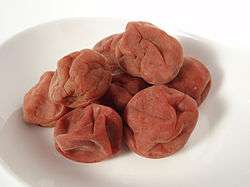Japanese
Alternative forms
Noun
梅干し (hiragana うめぼし, romaji umeboshi)
- umeboshi: salt-dried or pickled Japanese ume (a kind of plum); very sour, and often used as a condiment in Japanese cooking
- (slang) an elderly person (from the similarity of wrinkled skin to a wrinkled umeboshi; compare usage of English prune)
- (medicine) an unripe Japanese ume that has been smoked over a fire until black, used in traditional medicines and as a pigment
Synonyms
- (elderly person): 老人 (rōjin)
- (medicine): 烏梅 (ubai), 燻梅 (fusubeume)
Derived terms
Derived terms
- 梅干し和え (umeboshi ae), 梅干和 (umeboshi ae): a dressing or sauce for fish or vegetables made of umeboshi mixed with sugar or other sweetener
- 梅干し飴 (umeboshi ame), 梅干飴 (umeboshi ame): "umeboshi candy": a sweet resembling an umeboshi in shape and/or size and/or flavor
- 梅干し磯巾着 (umeboshi iso ginchaku), 梅干磯巾着 (umeboshi iso ginchaku): Actiniidae, a family of sea anemone
- 梅干しの木 (umeboshi no ki), 梅干の木 (umeboshi no ki): alternate term for 権萃 (gonzui) or 三つ葉空木 (mitsuba utsugi), the Staphylea bumalda, a kind of bladdernut tree
- 梅干し婆 (umeboshi baba), 梅干婆 (umeboshi baba): (derogatory) a wrinkly elderly woman
|
Descendants
References
-
↑ 1988, 国語大辞典(新装版) (Kokugo Dai Jiten, Revised Edition) (in Japanese), Tōkyō: Shogakukan
-
1 2 2006, 大辞林 (Daijirin), Third Edition (in Japanese), Tōkyō: Sanseidō, ISBN 4-385-13905-9
-
↑ 1998, NHK日本語発音アクセント辞典 (NHK Japanese Pronunciation Accent Dictionary) (in Japanese), Tōkyō: NHK, ISBN 978-4-14-011112-3
